Pomegranate (Punica granatum) is a fruit known for its vibrant ruby-red arils and unique sweet-tart flavor. Throughout history, this ancient fruit has been esteemed for both its culinary and medicinal properties. In recent years, scientific research has shed light on the numerous health benefits associated with the consumption of pomegranates. This article aims to explore the evidence-backed advantages of incorporating pomegranates into your diet.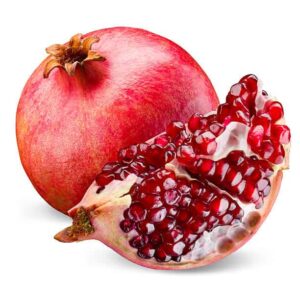
Rich Source of Antioxidants
Pomegranates are packed with powerful antioxidants, including anthocyanins, ellagic acid, and punicalagins. These compounds scavenge harmful free radicals in the body, reducing oxidative stress and mitigating cellular damage. Several studies have shown that regular consumption of pomegranate or its juice can increase the body’s overall antioxidant capacity, potentially protecting against chronic diseases such as heart disease, cancer, and neurodegenerative disorders.
Pomegranates are unique in their antioxidant profile, boasting a diverse array of polyphenols not commonly found in other fruits. One such compound is punicalagin, which is particularly abundant in pomegranate juice and has been studied for its potent antioxidant and anti-inflammatory properties. Another notable antioxidant present in pomegranates is ellagic acid, which has been associated with various health benefits, including anti-cancer effects by inhibiting the growth of cancer cells and promoting their programmed cell death.
Furthermore, pomegranates contain high levels of vitamin C, another potent antioxidant known for its role in scavenging free radicals and supporting overall immune function. The combination of these antioxidants in pomegranates offers synergistic effects, enhancing their ability to combat oxidative stress and protect against chronic diseases.
Heart Health
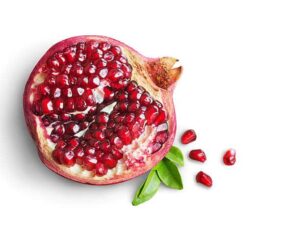 Numerous studies suggest that pomegranate consumption can have a positive impact on heart health. The fruit’s potent antioxidant and anti-inflammatory properties help reduce LDL cholesterol oxidation, which is a crucial step in the development of atherosclerosis. Research indicates that drinking pomegranate juice can lead to significant improvements in blood pressure levels and blood vessel function, potentially reducing the risk of cardiovascular events.
Numerous studies suggest that pomegranate consumption can have a positive impact on heart health. The fruit’s potent antioxidant and anti-inflammatory properties help reduce LDL cholesterol oxidation, which is a crucial step in the development of atherosclerosis. Research indicates that drinking pomegranate juice can lead to significant improvements in blood pressure levels and blood vessel function, potentially reducing the risk of cardiovascular events.
Furthermore, pomegranates contain high levels of polyphenols, particularly punicalagins and anthocyanins, which contribute to their cardiovascular benefits. Punicalagins, specifically, have been shown to have potent antioxidant effects that may help protect the heart by scavenging harmful free radicals and reducing oxidative stress. Additionally, anthocyanins contribute to pomegranates’ vibrant red color and also possess anti-inflammatory properties, further supporting heart health by reducing inflammation in the blood vessels and improving overall vascular function.
Moreover, pomegranates are rich in dietary nitrates, which have been linked to improved cardiovascular function. These nitrates are converted into nitric oxide in the body, a molecule known for its vasodilatory effects, meaning it helps widen and relax blood vessels, improving blood flow and lowering blood pressure. This vasodilatory effect of nitric oxide can enhance oxygen delivery to tissues, reduce the workload on the heart, and promote overall cardiovascular health. Therefore, incorporating pomegranates into a balanced diet may not only offer direct antioxidant and anti-inflammatory benefits but also support heart health through their nitrate content and vasodilatory effects.
Anti-Inflammatory Effects
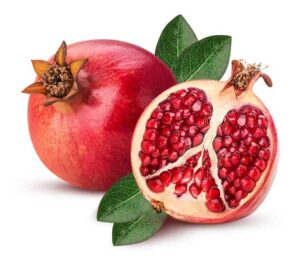 Inflammation is a natural response of the body to injury or infection, but chronic inflammation can contribute to various diseases. Pomegranates have been shown to possess anti-inflammatory properties that may help alleviate inflammatory conditions such as arthritis and inflammatory bowel disease.
Inflammation is a natural response of the body to injury or infection, but chronic inflammation can contribute to various diseases. Pomegranates have been shown to possess anti-inflammatory properties that may help alleviate inflammatory conditions such as arthritis and inflammatory bowel disease.
Moreover, the anti-inflammatory properties of pomegranates are attributed to their rich content of bioactive compounds, particularly punicalagins and ellagic acid. These compounds exhibit potent antioxidant activity, scavenging free radicals and reducing oxidative stress within the body. By mitigating oxidative stress, pomegranates help modulate the activity of inflammatory enzymes and cytokines, thereby dampening the inflammatory response. Additionally, studies have highlighted the role of pomegranate-derived polyphenols in inhibiting the production of pro-inflammatory molecules such as tumor necrosis factor-alpha (TNF-α) and interleukin-6 (IL-6), further attenuating inflammatory pathways.
Furthermore, pomegranates contain unique phytochemicals like punicic acid, a type of conjugated linolenic acid, which contributes to their anti-inflammatory effects. Punicic acid has been shown to inhibit the expression of inflammatory mediators like cyclooxygenase-2 (COX-2) and inducible nitric oxide synthase (iNOS), both of which play crucial roles in the inflammatory cascade. Additionally, pomegranate extracts have been found to modulate the gut microbiota, promoting the growth of beneficial bacteria like Lactobacillus and Bifidobacterium while suppressing the proliferation of pathogenic microbes. This modulation of the gut microbiome is increasingly recognized as a critical factor in regulating systemic inflammation, highlighting yet another mechanism through which pomegranates exert their anti-inflammatory effects.
Cancer Prevention
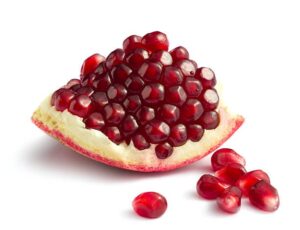 Several studies have suggested that pomegranates might have anti-cancer effects. The fruit’s bioactive compounds have demonstrated the ability to inhibit the proliferation of cancer cells and induce apoptosis (programmed cell death) in various cancer types, including breast, prostate, and colon cancer.
Several studies have suggested that pomegranates might have anti-cancer effects. The fruit’s bioactive compounds have demonstrated the ability to inhibit the proliferation of cancer cells and induce apoptosis (programmed cell death) in various cancer types, including breast, prostate, and colon cancer.
Moreover, pomegranates are rich in polyphenols, particularly ellagitannins such as punicalagins and ellagic acid, which possess potent antioxidant properties. These compounds help neutralize harmful free radicals in the body, reducing oxidative stress and inflammation, both of which are linked to the development and progression of cancer. Additionally, pomegranates contain unique phytochemicals like punicic acid, a type of conjugated linolenic acid, which has been associated with anti-cancer effects by interfering with cancer cell metabolism and signaling pathways.
Furthermore, the synergistic effects of pomegranate compounds, along with their ability to modulate various molecular targets involved in cancer growth and metastasis, make them promising candidates for cancer prevention and adjunctive therapy. Studies have also indicated that pomegranate extracts may enhance the efficacy of conventional cancer treatments like chemotherapy and radiation therapy while mitigating their adverse effects on healthy cells. The multifaceted nature of pomegranates in targeting multiple hallmarks of cancer underscores their potential as a natural adjunct to conventional cancer management strategies.
Immune Support
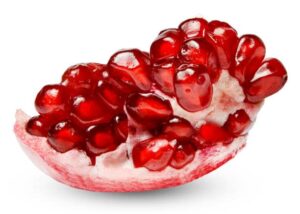 The vitamin C content of pomegranates plays a crucial role in supporting the immune system. Vitamin C enhances the production and function of white blood cells, strengthening the body’s defense against infections and illnesses. Additionally, pomegranate extracts have exhibited antimicrobial properties, helping combat certain bacterial and fungal infections.
The vitamin C content of pomegranates plays a crucial role in supporting the immune system. Vitamin C enhances the production and function of white blood cells, strengthening the body’s defense against infections and illnesses. Additionally, pomegranate extracts have exhibited antimicrobial properties, helping combat certain bacterial and fungal infections.
Furthermore, the immune-boosting properties of pomegranates extend beyond just vitamin C. These ruby-red jewels are rich in potent antioxidants, such as polyphenols and anthocyanins, which contribute to their remarkable ability to neutralize free radicals in the body. By reducing oxidative stress, pomegranates help fortify the immune system and may play a role in preventing chronic diseases.
In addition to their antioxidant prowess, pomegranates contain unique bioactive compounds that have been studied for their anti-inflammatory effects. Chronic inflammation can compromise the immune response over time, making it crucial to address this aspect for overall immune support. Pomegranate’s anti-inflammatory properties may aid in modulating the immune system, promoting a balanced and efficient response to various challenges.
Digestive Health
 Pomegranates are particularly notable for their unique blend of soluble and insoluble fiber, making them a standout choice for digestive health. Soluble fiber forms a gel-like substance in the gut, which helps to soften stool and regulate bowel movements. On the other hand, insoluble fiber adds bulk to stool, facilitating its passage through the digestive tract and preventing constipation. This dual action of fiber in pomegranates not only aids in maintaining regularity but also contributes to overall gut health by supporting a diverse microbiota.
Pomegranates are particularly notable for their unique blend of soluble and insoluble fiber, making them a standout choice for digestive health. Soluble fiber forms a gel-like substance in the gut, which helps to soften stool and regulate bowel movements. On the other hand, insoluble fiber adds bulk to stool, facilitating its passage through the digestive tract and preventing constipation. This dual action of fiber in pomegranates not only aids in maintaining regularity but also contributes to overall gut health by supporting a diverse microbiota.
Moreover, pomegranates contain compounds such as punicalagins and anthocyanins, which possess potent anti-inflammatory and antioxidative properties. These bioactive compounds have been linked to reduced inflammation in the gut lining, which is beneficial for conditions like inflammatory bowel disease (IBD) and irritable bowel syndrome (IBS). By calming inflammation and scavenging free radicals, pomegranates help to protect the delicate balance of the gastrointestinal system, promoting optimal functioning and reducing the risk of digestive disorders.
Cognitive Function
Emerging research suggests that pomegranates may have a positive impact on cognitive function and brain health. Studies have shown that the fruit’s polyphenols may help protect brain cells from oxidative stress and inflammation, potentially reducing the risk of neurodegenerative diseases like Alzheimer’s and Parkinson’s.
Pomegranates are particularly rich in a unique class of polyphenols called punicalagins, which are potent antioxidants known for their neuroprotective effects. These compounds have been found to cross the blood-brain barrier, allowing them to directly interact with brain cells and mitigate the harmful effects of oxidative stress. Additionally, pomegranates contain other bioactive substances like flavonoids and tannins, which further contribute to their cognitive benefits.
Moreover, research suggests that pomegranates may enhance cognitive function through various mechanisms beyond antioxidant activity. For instance, some studies indicate that the fruit’s components could potentially modulate signaling pathways involved in synaptic plasticity and neurotransmitter function, both of which are crucial for learning and memory processes. Furthermore, certain compounds in pomegranates have been shown to exhibit anti-inflammatory properties, which could help alleviate neuroinflammation, a common feature of many neurodegenerative disorders.
Skin Health
The antioxidants found in pomegranates can also benefit the skin. These compounds may help protect the skin from damage caused by ultraviolet (UV) rays, pollution, and other environmental factors, thereby promoting a more youthful appearance. Pomegranate extracts have been used in topical skincare products to aid in collagen production and improve skin texture.
Pomegranates are rich in vitamin C, which is crucial for collagen synthesis, a process vital for maintaining skin elasticity and firmness. Additionally, the fruit contains ellagic acid, a potent polyphenol known for its anti-inflammatory properties. This compound helps soothe irritated skin and may contribute to reducing the appearance of wrinkles and fine lines.
Moreover, pomegranate seed oil, extracted from the seeds of the fruit, is a prized ingredient in skincare formulations. This oil is packed with omega-5 fatty acids, also known as punicic acid, renowned for its ability to hydrate and nourish the skin. Its lightweight texture makes it suitable for all skin types, including oily and acne-prone skin, providing moisture without clogging pores. Regular use of products containing pomegranate seed oil can result in a visibly smoother and more radiant complexion, making it a valuable addition to any skincare routine.
Weight Management
Incorporating pomegranates into a balanced diet may also support weight management efforts. The fruit’s fiber content helps promote feelings of fullness, reducing overall calorie intake. Moreover, the polyphenols in pomegranates have been linked to enhanced metabolism and improved fat metabolism.
Pomegranates are not only low in calories but also rich in antioxidants, particularly punicalagins and anthocyanins, which have been associated with reducing inflammation and improving insulin sensitivity. This can be beneficial for individuals aiming to manage their weight, as better insulin sensitivity means cells are more efficient at using glucose for energy rather than storing it as fat. Additionally, the high water content of pomegranate seeds can contribute to hydration, which is often overlooked but crucial for maintaining a healthy metabolism and supporting weight loss efforts.
Furthermore, incorporating pomegranates into a balanced diet provides essential nutrients such as vitamin C, vitamin K, and potassium, which are vital for overall health and well-being. These nutrients support various metabolic processes, including energy production and proper functioning of the cardiovascular system. By including pomegranates in meals or snacks, individuals can not only satisfy their sweet cravings in a nutritious way but also potentially aid their weight management journey by promoting satiety, enhancing metabolism, and supporting overall health.
Diabetes Management
Pomegranates, with their rich antioxidant content, have been linked to potential benefits in diabetes management. These antioxidants, such as flavonoids and polyphenols, have been shown to protect cells from damage caused by oxidative stress, a common complication in diabetes. Additionally, pomegranates contain compounds that may inhibit inflammatory pathways implicated in insulin resistance, potentially improving the body’s response to insulin.
Furthermore, pomegranates possess unique characteristics that make them a valuable addition to a diabetic diet. Their low glycemic index means they have a minimal impact on blood sugar levels when consumed in moderation, making them a suitable choice for individuals aiming to control their glucose levels.
Additionally, the high fiber content of pomegranate seeds can aid in regulating blood sugar levels by slowing down digestion and absorption, preventing rapid spikes in glucose. Incorporating pomegranates into a balanced diet alongside other diabetes-friendly foods may offer additional benefits beyond blood sugar control, such as cardiovascular health support due to their potential to lower cholesterol levels and reduce arterial plaque formation.
However, it’s essential for individuals with diabetes to monitor their intake of pomegranates and consult with a healthcare professional to ensure it aligns with their overall dietary plan and treatment regimen. More comprehensive research is needed to fully understand the mechanisms behind pomegranates’ effects on diabetes management and to establish specific recommendations for their inclusion in diabetic diets.
Dental Health
Compounds found in pomegranates have demonstrated antimicrobial activity against oral bacteria, which could potentially contribute to improved dental health. Incorporating pomegranate extracts into oral care products may aid in preventing common oral problems such as gingivitis and plaque formation.
Pomegranates, with their rich reserves of polyphenols and flavonoids, possess unique properties that make them a promising candidate for enhancing dental health. These compounds have been shown to exhibit potent antioxidant and anti-inflammatory effects, which are crucial for combating the oxidative stress and inflammation associated with oral diseases like periodontitis. Additionally, the presence of punicalagins in pomegranates has been linked to inhibiting the activity of certain enzymes involved in the breakdown of dental enamel, thus offering protective benefits against tooth erosion and decay.
Moreover, the natural astringent properties of pomegranate extracts make them effective in tightening gum tissues and reducing bleeding, thereby promoting gum health and reducing the risk of gum disease. The ability of pomegranate-derived compounds to interfere with the adherence of oral pathogens to tooth surfaces further underscores their potential in preventing the formation of dental plaque and reducing the incidence of cavities.
Joint Health
Pomegranates may offer benefits for individuals suffering from joint pain and arthritis. The fruit’s anti-inflammatory properties can help reduce joint inflammation and alleviate symptoms associated with arthritis, potentially improving joint mobility and overall quality of life.
Pomegranates stand out among other fruits due to their rich content of antioxidants, particularly punicalagins and anthocyanins, which contribute to their potent anti-inflammatory effects. These compounds target inflammatory pathways in the body, inhibiting the production of pro-inflammatory molecules responsible for joint degradation and pain. Additionally, pomegranates contain unique compounds like ellagic acid, known for its ability to protect cartilage from damage and promote its regeneration.
Liver Health
Studies suggest that pomegranate extracts may have a protective effect on the liver. The fruit’s antioxidants may help combat oxidative stress and inflammation in the liver, promoting better liver function and reducing the risk of liver diseases.
Pomegranates are particularly rich in polyphenols, such as punicalagins and ellagic acid, which are potent antioxidants known for their ability to scavenge free radicals and reduce oxidative damage. These compounds not only protect liver cells from oxidative stress but also exhibit anti-inflammatory properties, which can help alleviate inflammation-induced liver damage.
Furthermore, pomegranates contain unique bioactive compounds like punicic acid, a type of conjugated fatty acid found in the seeds and oil of the fruit. Research suggests that punicic acid may contribute to liver health by modulating lipid metabolism, reducing fat accumulation in the liver, and improving lipid profile, which is crucial for preventing conditions like non-alcoholic fatty liver disease (NAFLD) and liver fibrosis.
Menopausal Symptoms
Some research indicates that pomegranate extracts may help alleviate certain menopausal symptoms, such as hot flashes and night sweats. The phytoestrogens present in pomegranates may provide a natural alternative for women experiencing menopausal discomfort.
Pomegranates are rich in antioxidants and phytoestrogens, which are plant-based compounds that mimic the effects of estrogen in the body. These phytoestrogens, such as estrone and estradiol, can help regulate hormonal imbalances that occur during menopause, potentially reducing the frequency and severity of symptoms like mood swings and vaginal dryness. Additionally, the anti-inflammatory properties of pomegranate may also contribute to easing discomfort associated with menopause.
Bone Health
Pomegranates contain essential minerals like calcium and phosphorus, which play a crucial role in maintaining bone health. Regular consumption of the fruit may contribute to stronger bones and reduce the risk of osteoporosis.
Pomegranates also boast a unique compound known as punicalagins, which have been linked to potential benefits for bone health. These compounds may help to inhibit the breakdown of bone by reducing inflammation and oxidative stress, thereby preserving bone density and strength. Additionally, the high antioxidant content in pomegranates can contribute to overall bone health by neutralizing free radicals that can cause damage to bone cells.
Furthermore, studies have suggested that pomegranate extract may have a positive impact on bone formation and regeneration. Some research indicates that certain components of pomegranate extract can stimulate osteoblasts, the cells responsible for building new bone tissue. This dual action of preserving existing bone mass while promoting the formation of new bone suggests that pomegranates could be a valuable addition to a diet aimed at supporting skeletal health.
Hair Health
The antioxidants found in pomegranates may help protect hair follicles from oxidative stress and damage, supporting healthy hair growth. Additionally, the fruit’s iron content may contribute to healthier, more vibrant hair.
Pomegranates are also rich in vitamins and minerals like vitamin C, which plays a crucial role in collagen production. Collagen is essential for maintaining the strength and integrity of hair strands, preventing breakage and split ends. Moreover, the fruit contains vitamin E, known for its moisturizing properties that can help nourish the scalp and promote overall hair health.
Furthermore, pomegranates contain punicalagins, potent antioxidants that not only protect the hair from environmental damage but also help improve circulation to the scalp. Better blood flow to the scalp means enhanced delivery of nutrients and oxygen to the hair follicles, which is vital for stimulating healthy hair growth.
Nutritional values for 100 grams of pomegranate
- Calories: 83 kcal
- Carbohydrates: 18.7 grams
- Sugars: 13.7 grams
- Protein: 1.7 grams
- Fat: 1.2 grams
- Dietary Fiber: 4 grams
- Vitamin C: 10.2 mg
- Vitamin K: 16.4 µg
- Folate (Vitamin B9): 38 µg
- Potassium: 236 mg
- Calcium: 10 mg
- Iron: 0.3 mg
- Magnesium: 12 mg
Keep in mind that nutritional values may vary slightly depending on the size and ripeness of the fruit. Additionally, values can be influenced by factors such as preparation or storage methods.
Conclusion
Incorporating pomegranates into your diet can offer a wide array of health benefits, backed by scientific research. From promoting heart health to providing potent antioxidants and supporting the immune system, the consumption of pomegranates can be a valuable addition to a balanced and healthy lifestyle. However, while pomegranates are generally safe for most people, it’s essential to consult with a healthcare professional, especially if you have any underlying medical conditions or allergies.
 Indulge your taste buds in a delightful culinary journey with the tantalizing flavors and vibrant colors of Jamie Oliver’s Aubergine and Pomegranate Salad. This exquisite salad brings together the earthy richness of eggplant, the sweetness of pomegranate, and a symphony of complementary ingredients to create a truly sensational dish that’s as pleasing to the eyes as it is to the palate.
Indulge your taste buds in a delightful culinary journey with the tantalizing flavors and vibrant colors of Jamie Oliver’s Aubergine and Pomegranate Salad. This exquisite salad brings together the earthy richness of eggplant, the sweetness of pomegranate, and a symphony of complementary ingredients to create a truly sensational dish that’s as pleasing to the eyes as it is to the palate.
Contraindications
While pomegranates offer numerous health benefits, there are some potential contraindications and considerations to keep in mind:
Allergies:
Some individuals may be allergic to pomegranates or certain components present in the fruit. If you experience any allergic reactions such as itching, rash, or swelling after consuming pomegranates, it’s essential to avoid them and seek medical attention.
Drug Interactions:
Pomegranates may interact with certain medications, particularly those metabolized by the liver’s cytochrome P450 enzymes. The fruit may interfere with the effectiveness of drugs or alter their metabolism, leading to either reduced or increased drug levels in the bloodstream. If you are taking any medications, especially prescription drugs, consult your healthcare provider before consuming pomegranates or their extracts.
Gastrointestinal Issues:
Pomegranates are relatively safe for most people when consumed in moderation. However, some individuals with sensitive stomachs may experience digestive issues, such as upset stomach, diarrhea, or bloating, after consuming pomegranates. If you have a history of gastrointestinal problems, monitor your body’s response to pomegranates and adjust your intake accordingly.
Blood Pressure Regulation:
While pomegranates have been associated with blood pressure-lowering effects, this can be a concern for individuals with already low blood pressure levels. If you have hypotension (low blood pressure), consuming excessive amounts of pomegranate or its juice may further reduce blood pressure and cause dizziness or fainting. In such cases, it’s advisable to consume pomegranates in moderation.
Blood Sugar Management:
While pomegranates have been studied for potential benefits in diabetes management, they may also have an impact on blood sugar levels. If you have diabetes or are on medications to control blood sugar, monitor your levels closely when consuming pomegranates and discuss it with your healthcare provider.
Interference with Thyroid Function:
Some studies suggest that pomegranate consumption may affect thyroid function, particularly in individuals with existing thyroid disorders. If you have thyroid issues, speak with your doctor before including pomegranates in your diet.
Dental Considerations:
Pomegranate juice, with its natural sugars, can be acidic and potentially harmful to dental health when consumed in excessive amounts. It is recommended to rinse your mouth with water after consuming pomegranate juice and practice good oral hygiene to protect your teeth.
As with any dietary changes or supplements, it is crucial to consult with a healthcare professional, especially if you have any underlying health conditions, allergies, or are taking medications. Moderation is key, and individual responses to pomegranate consumption may vary. If you experience any adverse effects after consuming pomegranates, discontinue their use and seek medical advice.
Fascinating Facts About Pomegranates
- Secret Chamber of Arils:
Deep within the labyrinthine structure of a pomegranate lies a hidden chamber of arils, each encapsulating a tiny seed surrounded by succulent pulp. What makes this arrangement peculiar is the meticulous organization of these arils, arranged in a precise hexagonal pattern reminiscent of a beehive. This geometric marvel not only enhances the visual appeal of the fruit but also showcases nature’s intricate design at its finest.
- Time Capsule Seeds:
Embedded within the core of a pomegranate are seeds that serve as tiny time capsules, encapsulating the essence of centuries-old cultivation techniques and ancestral wisdom. These seeds, passed down through generations, carry the genetic heritage of ancient civilizations, preserving a legacy of resilience and adaptability. As we bite into a pomegranate seed, we taste not just its sweet-tart flavor but also the echoes of history locked within its kernel.
- Resilient Pericarp Armor:
Surrounding the luscious arils of a pomegranate is a formidable armor known as the pericarp, comprising a tough outer shell that shields the delicate seeds within. What sets this pericarp apart is its remarkable resilience, capable of withstanding adverse conditions and protecting the precious cargo of seeds from harm. From extreme temperatures to physical trauma, the pericarp stands as a testament to nature’s ingenuity and the fruit’s innate ability to thrive in challenging environments.
- Antioxidant Alchemy:
Pomegranates possess a potent arsenal of antioxidants, including punicalagins and anthocyanins, that imbue them with remarkable health benefits. However, what makes these antioxidants truly fascinating is their ability to undergo a transformative process akin to alchemy within the human body. As we consume pomegranates, these antioxidants engage in a complex dance with free radicals, neutralizing their harmful effects and promoting cellular rejuvenation. This antioxidant alchemy not only enhances our well-being but also highlights the symbiotic relationship between pomegranates and human physiology.
- Mythical Medley of Legends:
Throughout history, pomegranates have been shrouded in a tapestry of mythical tales and folklore, weaving a mesmerizing medley of legends from diverse cultures. From the Greek myth of Persephone and Hades to the Persian epic of Shahnameh, pomegranates have left an indelible mark on the collective imagination of humanity. These mythical narratives, infused with symbolism and allegory, imbue pomegranates with a timeless allure that transcends mere culinary delight.
- Enigmatic Elixir of Life:
In ancient civilizations, pomegranates were revered as a symbol of immortality and vitality, believed to bestow longevity upon those who partook of their divine essence. This mystical association with the elixir of life continues to echo through the annals of history, casting pomegranates as enigmatic emblems of rejuvenation and renewal. Whether savored as a succulent snack or imbued with symbolic significance in ritualistic ceremonies, pomegranates remain inexorably linked to the eternal quest for vitality and eternal youth.
- Cosmic Connection:
In ancient cosmology, pomegranates were revered as celestial symbols, believed to hold the secrets of the cosmos within their intricate structure. Each aril, with its radiant crimson hue, was seen as a microcosm reflecting the vast expanse of the universe. The arrangement of seeds within the fruit was thought to mirror the celestial patterns of stars in the night sky, fostering a deep spiritual connection between humanity and the cosmos.
- Esoteric Embodiment of Time:
Pomegranates, with their cyclical nature and seasonal ripening, embody the eternal dance of time and renewal. In some esoteric traditions, the segmented structure of the fruit symbolizes the cyclical phases of existence, from birth and growth to decay and regeneration. The act of partaking of pomegranate seeds was believed to imbue individuals with a deeper understanding of temporal rhythms and the cyclical nature of life itself.
- Alchemical Elixir of Transformation:
Pomegranates were revered in alchemical lore as symbols of transformation and metamorphosis, embodying the mystical process of transmutation from base elements to spiritual enlightenment. The vibrant color of the arils represented the prima materia, the raw material of existence, undergoing a process of purification and refinement akin to the alchemical quest for the philosopher’s stone. Consuming pomegranates was believed to catalyze inner alchemical processes, leading to spiritual awakening and enlightenment.
- Cryptic Codex of Symbolism:
Within the intricate symbolism of pomegranates lies a cryptic codex of esoteric meaning, encoded in their ancient myths, religious texts, and mystical traditions. Across cultures and civilizations, pomegranates have been associated with themes of fertility, abundance, and divine wisdom, serving as potent symbols of spiritual enlightenment and transcendence. Their enigmatic presence in sacred art and ritualistic practices speaks to their enduring significance as vessels of esoteric knowledge and hidden wisdom.
- Enigmatic Essence of Vitality:
Pomegranates, with their lush abundance of seeds and succulent arils, embody the essence of vitality and life force. In esoteric healing traditions, the fruit was revered for its regenerative properties, believed to rejuvenate the body, mind, and spirit. The act of consuming pomegranates was seen as a sacred communion with the life-affirming energies of the universe, fostering vitality, resilience, and inner harmony.
To explore more plants, please visit our page about plants
References:
- Gil MI, Tomás-Barberán FA, Hess-Pierce B, et al. Antioxidant activity of pomegranate juice and its relationship with phenolic composition and processing. J Agric Food Chem. 2000;48(10):4581-4589.
- Seeram NP, Aviram M, Zhang Y, et al. Comparison of antioxidant potency of commonly consumed polyphenol-rich beverages in the United States. J Agric Food Chem. 2008;56(4):1415-1422.
- Aviram M, Dornfeld L. Pomegranate juice consumption inhibits serum angiotensin converting enzyme activity and reduces systolic blood pressure. Atherosclerosis. 2001;158(1):195-198.
- Asgary S, Sahebkar A, Afshani MR, et al. Clinical evaluation of blood pressure lowering, endothelial function improving, hypolipidemic and anti-inflammatory effects of pomegranate juice in hypertensive subjects. Phytother Res. 2014;28(2):193-199.
- Heber D. Pomegranate Ellagitannins. In: Benzie IFF, Wachtel-Galor S, editors. Herbal Medicine: Biomolecular and Clinical Aspects. 2nd edition. Boca Raton (FL): CRC Press/Taylor & Francis; 2011. Chapter 10. Available from: https://www.ncbi.nlm.nih.gov/books/NBK92772/
- Sreeja S, Santhosh Kumar TR, Lakshmi BS, Sreeja S. Pomegranate extract demonstrate a selective estrogen receptor modulator profile in human tumor cell lines and in vivo models of estrogen deprivation. J Nutr Biochem. 2012;23(7):725-732.
- Khan GN, Gorin MA, Rosenthal D, et al. Pomegranate fruit extract impairs invasion and motility in human breast cancer. Integr Cancer Ther. 2009;8(3):242-253.
- Sartippour MR, Seeram NP, Rao JY, et al. Ellagitannin-rich pomegranate extract inhibits angiogenesis in prostate cancer in vitro and in vivo. Int J Oncol. 2008;32(2):475-480.
- Nair S, Nagar R, Gupta R, et al. Antibacterial activity of Punica granatum. Fitoterapia. 2005;76(1): 25-27.
Al-Zoreky N. Antimicrobial activity of pomegranate (Punica granatum L.) fruit peels. Int J Food Microbiol. 2009;134(3):244-248.
- Jurenka JS. Therapeutic applications of pomegranate (Punica granatum L.): a review. Altern Med Rev. 2008;13(2):128-144.
- 12. Adams LS, Seeram NP, Aggarwal BB, et al. Pomegranate juice, total pomegranate ellagitannins, and punicalagin suppress inflammatory cell signaling in colon cancer cells. J Agric Food Chem. 2006;54(3):980-985.
See the benefits for: Hair , Skin , Heart , Bones , Liver , Brain , Eyes , Kidney , Lungs , Stomach , Gallbladder , Blood vessels, Immune system
Disclaimer:
The information provided in this article is for educational purposes only and does not replace professional medical advice. Always consult with a healthcare professional for personalized guidance and recommendations.
